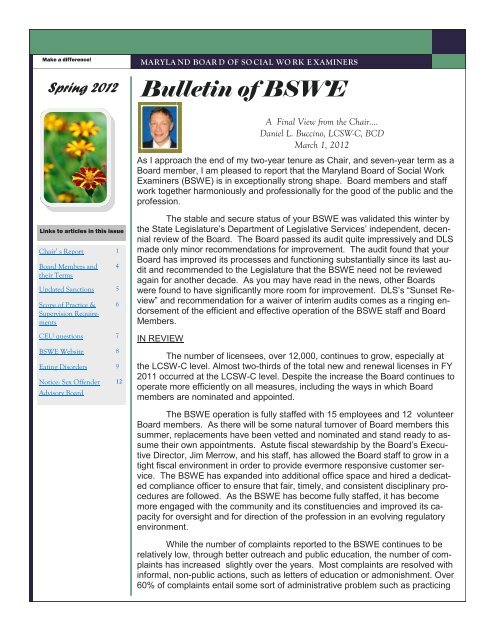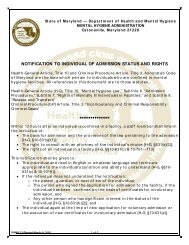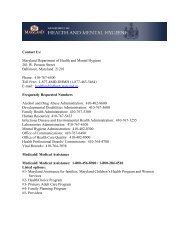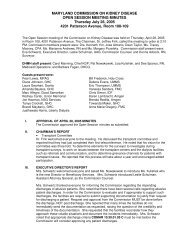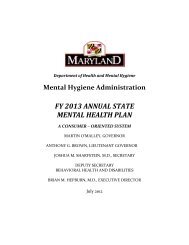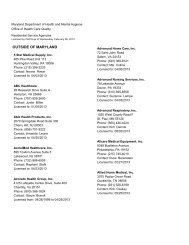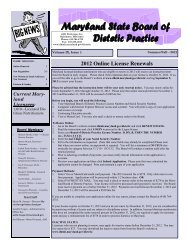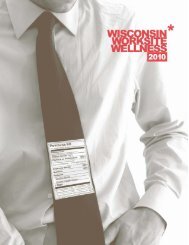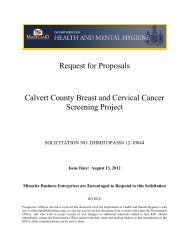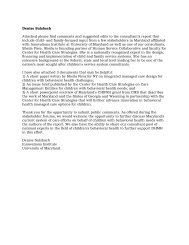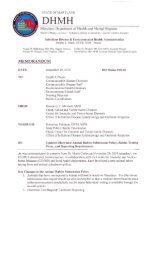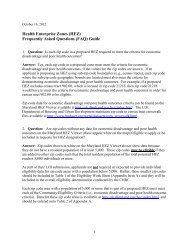Bulletin of BSWE - DHMH - Maryland.gov
Bulletin of BSWE - DHMH - Maryland.gov
Bulletin of BSWE - DHMH - Maryland.gov
Create successful ePaper yourself
Turn your PDF publications into a flip-book with our unique Google optimized e-Paper software.
Make a difference!<br />
Spring 2012<br />
Links to articles in this issue<br />
Chair’ s Report<br />
Board Members and<br />
their Terms<br />
Updated Sanctions<br />
Scope <strong>of</strong> Practice &<br />
Supervision Requirements<br />
CEU questions<br />
<strong>BSWE</strong> Website<br />
Eating Disorders<br />
Notice: Sex Offender<br />
Advisory Board<br />
1<br />
4<br />
5<br />
6<br />
7<br />
8<br />
9<br />
12<br />
M A R Y L A N D B O A R D O F S O C I A L W O R K E X A M I N E R S<br />
<strong>Bulletin</strong> <strong>of</strong> <strong>BSWE</strong><br />
A Final View from the Chair….<br />
Daniel L. Buccino, LCSW-C, BCD<br />
March 1, 2012<br />
As I approach the end <strong>of</strong> my two-year tenure as Chair, and seven-year term as a<br />
Board member, I am pleased to report that the <strong>Maryland</strong> Board <strong>of</strong> Social Work<br />
Examiners (<strong>BSWE</strong>) is in exceptionally strong shape. Board members and staff<br />
work together harmoniously and pr<strong>of</strong>essionally for the good <strong>of</strong> the public and the<br />
pr<strong>of</strong>ession.<br />
The stable and secure status <strong>of</strong> your <strong>BSWE</strong> was validated this winter by<br />
the State Legislature’s Department <strong>of</strong> Legislative Services’ independent, decennial<br />
review <strong>of</strong> the Board. The Board passed its audit quite impressively and DLS<br />
made only minor recommendations for improvement. The audit found that your<br />
Board has improved its processes and functioning substantially since its last audit<br />
and recommended to the Legislature that the <strong>BSWE</strong> need not be reviewed<br />
again for another decade. As you may have read in the news, other Boards<br />
were found to have significantly more room for improvement. DLS’s “Sunset Review”<br />
and recommendation for a waiver <strong>of</strong> interim audits comes as a ringing endorsement<br />
<strong>of</strong> the efficient and effective operation <strong>of</strong> the <strong>BSWE</strong> staff and Board<br />
Members.<br />
IN REVIEW<br />
The number <strong>of</strong> licensees, over 12,000, continues to grow, especially at<br />
the LCSW-C level. Almost two-thirds <strong>of</strong> the total new and renewal licenses in FY<br />
2011 occurred at the LCSW-C level. Despite the increase the Board continues to<br />
operate more efficiently on all measures, including the ways in which Board<br />
members are nominated and appointed.<br />
The <strong>BSWE</strong> operation is fully staffed with 15 employees and 12 volunteer<br />
Board members. As there will be some natural turnover <strong>of</strong> Board members this<br />
summer, replacements have been vetted and nominated and stand ready to assume<br />
their own appointments. Astute fiscal stewardship by the Board’s Executive<br />
Director, Jim Merrow, and his staff, has allowed the Board staff to grow in a<br />
tight fiscal environment in order to provide evermore responsive customer service.<br />
The <strong>BSWE</strong> has expanded into additional <strong>of</strong>fice space and hired a dedicated<br />
compliance <strong>of</strong>ficer to ensure that fair, timely, and consistent disciplinary procedures<br />
are followed. As the <strong>BSWE</strong> has become fully staffed, it has become<br />
more engaged with the community and its constituencies and improved its capacity<br />
for oversight and for direction <strong>of</strong> the pr<strong>of</strong>ession in an evolving regulatory<br />
environment.<br />
While the number <strong>of</strong> complaints reported to the <strong>BSWE</strong> continues to be<br />
relatively low, through better outreach and public education, the number <strong>of</strong> complaints<br />
has increased slightly over the years. Most complaints are resolved with<br />
informal, non-public actions, such as letters <strong>of</strong> education or admonishment. Over<br />
60% <strong>of</strong> complaints entail some sort <strong>of</strong> administrative problem such as practicing
Page 2<br />
Judy Levy, LCSW-C<br />
Vice Chair<br />
“By law,<br />
licensees are<br />
required to<br />
notify the<br />
Board in<br />
writing <strong>of</strong><br />
changes in<br />
address<br />
within 60<br />
days.”<br />
Thomas Smith, LSWA<br />
Secretary/ Treasurer<br />
Chair’s Report ( Continued from Page 1)<br />
<strong>Bulletin</strong> <strong>of</strong> <strong>BSWE</strong><br />
without a license, failing continuing education audits, or working with an unregistered<br />
supervisor. These administrative issues can still have extremely serious<br />
practical, financial, and risk management consequences. Over the past five<br />
years, about 6% <strong>of</strong> complaints have entailed serious dual relationship or other<br />
boundary violations with clients.<br />
ON-LINE<br />
Since 2005, the <strong>BSWE</strong> has transformed itself from seeming like a 19 th -<br />
century paper-intensive enterprise into a modern, 21 st century digital operation.<br />
The most visible manifestation <strong>of</strong> this is the Board’s website which is a comprehensive,<br />
easy to use, first-stop for all questions concerning <strong>Maryland</strong> social<br />
work licensure, laws, and regulations. On-line license renewals are another visible<br />
way by which the <strong>BSWE</strong> has gone digital, and its communications by way <strong>of</strong><br />
e-mail and e-newsletters are an indication <strong>of</strong> how the <strong>BSWE</strong> has been better<br />
able to engage with its licensees by more frequent and economical electronic<br />
communication. Instant on-line license and supervisor verification should ensure<br />
that no licensee or client shall have to work with an unlicensed social worker<br />
or colleague, or accrue hours toward advanced licensure with a supervisor<br />
who is not Board-approved and registered.<br />
The Board has gone greener by digitizing most <strong>of</strong> its current and past<br />
records, which also makes record retrieval more reliable and efficient. In the<br />
past year, the <strong>BSWE</strong> has minimized the amount <strong>of</strong> paper circulating to Board<br />
members by digitizing its monthly meeting packets and reports, which can be<br />
voluminous.<br />
Over the past seven years, the <strong>BSWE</strong> has overhauled all <strong>of</strong> its regulations,<br />
most notably its supervisory regulations (which have received subsequent,<br />
additional clarifications), our continuing education regulations, and most<br />
recently our Code <strong>of</strong> Ethics. The <strong>BSWE</strong> also has streamlined the process by<br />
which experienced social workers from out <strong>of</strong> state can apply for and receive an<br />
LCSW-C in <strong>Maryland</strong>.<br />
COLLABORATION<br />
Most importantly perhaps, the <strong>BSWE</strong> has opened its work processes to<br />
outside stakeholders for input and collaboration around workforce issues like<br />
the licensing and hiring <strong>of</strong> out <strong>of</strong> state licensees, and for consideration <strong>of</strong> pr<strong>of</strong>essional<br />
issues such as continuing education and the revision <strong>of</strong> our Code <strong>of</strong><br />
Ethics. The Board is about to undertake a full review <strong>of</strong> the entire statute <strong>gov</strong>erning<br />
social work practice in <strong>Maryland</strong> and is forming a large, diverse<br />
workgroup <strong>of</strong> stakeholders to consult around this important review. The unprecedented<br />
openness that the Board has shown in establishing these workgroups<br />
with outside stakeholders over the past several years has reinforced <strong>BSWE</strong>’s<br />
engagement with the community. The Board has demonstrated that it wishes to<br />
work with the social work community for the good <strong>of</strong> the pr<strong>of</strong>ession and the protection<br />
<strong>of</strong> the public.
Chair’s Report ( Continued from Page 2)<br />
CONCERNS<br />
Although the state <strong>of</strong> the <strong>BSWE</strong> is solid, and its accomplishments substantial,<br />
the Board remains concerned about the ongoing lack <strong>of</strong> awareness<br />
some licensees seem to have about the Board’s functioning, its statute and regulations,<br />
and the <strong>BSWE</strong>’s <strong>gov</strong>ernance <strong>of</strong> social work practice. For example,<br />
though the supervision regulations changed almost eight years ago, there are<br />
still far too many experienced LCSW-Cs who seems unaware <strong>of</strong> them, and still<br />
far too many LSWAs and LGSWs whose practice and experience accrual is at<br />
risk due to insufficient supervision. As the Board has stated before, it is incumbent<br />
on more experienced practitioners to be aware <strong>of</strong> the regulations in order<br />
to adequately guide newer licensees. It would appear that ignorance <strong>of</strong> the<br />
most basic regulations concerning supervision potentially creates substantial<br />
liability for agencies, supervisors, and supervisees, as well as inadequate service<br />
to clients.<br />
As on-line licensing has made renewal easier, full staffing has also allowed<br />
the Board to audit renewals more readily. There continue to be licensees<br />
who gamble with their licenses and livelihoods by not being truthful in on-line<br />
renewals, whether about continuing education or legal entanglements. This<br />
also creates substantial risk exposure for licensees and the public.<br />
And, sadly, far too many social workers remain unaware <strong>of</strong> the fact that<br />
not only is there a Code <strong>of</strong> Ethics for social workers in <strong>Maryland</strong> which supersedes<br />
any pr<strong>of</strong>essional association code <strong>of</strong> ethics, but that our Code <strong>of</strong> Ethics<br />
has been thoroughly overhauled within the past year. At a recent social work<br />
ethics conference, in a room <strong>of</strong> well over 100 social workers, only the presenter<br />
and one other person claimed to be aware <strong>of</strong> the Code <strong>of</strong> Ethics for social workers<br />
in <strong>Maryland</strong>, not to mention its revision.<br />
It is not possible to say what is “new” in the Code <strong>of</strong> Ethics because all <strong>of</strong><br />
it applies now to social work practice in <strong>Maryland</strong> and it will be the first layer <strong>of</strong><br />
review should there be any disciplinary complaint. <strong>Maryland</strong> remains at the<br />
forefront <strong>of</strong> states; our Code <strong>of</strong> Ethics includes contemporary language about<br />
research ethics, the need for a “pr<strong>of</strong>essional will,” or formal plan, for the disposition<br />
<strong>of</strong> clients and records in the event <strong>of</strong> a licensee’s incapacitation, competence<br />
with electronic media and all other treatment interventions, and the need<br />
to monitor the effectiveness <strong>of</strong> one’s interventions.<br />
Sexual relationships with current or former clients remain expressly forbidden,<br />
despite the slightly more nuanced position on this issue by other pr<strong>of</strong>essions<br />
and our own pr<strong>of</strong>essional associations.<br />
HEADS UP<br />
I continue to liken social work licensure to having a driver’s license, yet<br />
far more <strong>of</strong> us seem aware <strong>of</strong> the rules <strong>of</strong> the road than we are <strong>of</strong> the rules <strong>of</strong><br />
the road <strong>of</strong> social work practice in <strong>Maryland</strong>. Even though some may continue<br />
to violate the law, everyone knows that handheld cell calls and texting are now<br />
illegal in <strong>Maryland</strong>. However, many seem unaware <strong>of</strong> the ongoing revisions in<br />
Make a difference!<br />
Page 3<br />
Yvonne Bryant, LCSW-C<br />
Become a<br />
Volunteer.<br />
Join<br />
<strong>Maryland</strong><br />
Pr<strong>of</strong>essional<br />
Volunteer<br />
Corps.<br />
For more<br />
information<br />
go to<br />
OP&R<br />
website<br />
Joyce Bell, LCSW-C, PhD
Page 4<br />
Ge<strong>of</strong>frey Greif, DSW, LCSW-C<br />
Educational Member<br />
<strong>Maryland</strong><br />
consent<br />
orders are<br />
now available<br />
to the public<br />
on the<br />
Board’s<br />
website.<br />
A. Denise Peak, LGSW<br />
Chair’s Report ( Continued from Page 3)<br />
Board Members and their Terms<br />
Daniel L. Buccino, LCSW-C,<br />
BCD<br />
Chair<br />
07/01/2008- 06/30/2012<br />
Thomas Smith, LSWA<br />
Board Member<br />
(Secretary/Treasurer)<br />
07/01/2010- 06/30/2014<br />
Judy Levy, LCSW-C<br />
Vice Chair<br />
07/01/2011 - 06/30/2015<br />
Ge<strong>of</strong>frey Greif, DSW, LCSW-C<br />
Educational Member<br />
10/01/2008- 06/30/2012<br />
<strong>Bulletin</strong> <strong>of</strong> <strong>BSWE</strong><br />
the statutes and regulations that <strong>gov</strong>ern our practice, our careers, and our livelihoods.<br />
It is imperative that licensees read and respond to all <strong>BSWE</strong> communications<br />
and check the website regularly. Indeed, such active engagement is a requirement<br />
for licensees: passivity and claims <strong>of</strong> ignorance will not suffice.<br />
Since the regulation <strong>of</strong> pr<strong>of</strong>essions is held to be a State’s right, there is no<br />
national social work license. Licensing standards vary by state, and since our<br />
nation is increasingly mobile and linked electronically, it is essential that social<br />
workers become familiar with licensing standards in any state in which they practice,<br />
just as we are obliged to obtain new driver’s licenses and license plates<br />
when we relocate.<br />
In conclusion, it has been a tremendous honor and a wonderful opportunity<br />
to serve on the <strong>BSWE</strong>. I am enormously grateful for the trust placed in me and<br />
deeply appreciative <strong>of</strong> all that I have learned over the past seven years and for<br />
the opportunity to work with so many talented and dedicated social workers,<br />
Board members, and staff. I trust we on the Board have been able to contribute<br />
a modest fraction in return for the good <strong>of</strong> the pr<strong>of</strong>ession and the protection <strong>of</strong> the<br />
public.<br />
And yet, given the drifting attention <strong>of</strong> some licensees to the requirements<br />
<strong>of</strong> our work, it is necessary to end where I began one <strong>of</strong> my earliest columns, by<br />
reference to a poem by Mary Oliver, Yes! No!: “To pay attention, this is our endless<br />
and proper work.”<br />
Very truly yours,<br />
Daniel L. Buccino, LCSW-C, BCD<br />
Chairman<br />
<strong>Maryland</strong> Board <strong>of</strong> Social Work Examiners<br />
Yvonne Bryant, LCSW-C<br />
Board Member<br />
07/01/2009 - 06/30/2013<br />
A. Denise Peak, LGSW<br />
Board Member<br />
07/01/2008 - 06/30/2012<br />
Peggy Barnes, LCSW-C<br />
Board Member<br />
07/01/2009- 06/30/2013<br />
Joyce Bell, LCSW-C, PhD<br />
Board Member<br />
07/01/2010- 06/30/2014<br />
Loretta Wall, LCSW-C<br />
Board Member<br />
07/01/2011- 06/30/2015<br />
Lillye Wells<br />
Consumer Member<br />
07/01/2008- 06/30/2012<br />
Trinita Robinson<br />
Consumer Member<br />
07/01/2009 - 06/30/2013<br />
Denise Capaci, LCSW-C<br />
Board Member<br />
07/01/2011 - 06/30/2015
Updated Sanctions: From June 1, 2011 through March 1, 2012<br />
If you would like to read the complete Board Order or read all the Board's sanc-<br />
tions, go to Disciplinary Actions on the Board’s website.<br />
Michael Ryan Jr.<br />
LCSW-C 08600<br />
Shirley E. Singer<br />
LGSW G07430<br />
Donny W. Smith<br />
LCSW-C 08197<br />
Monique N. Wilson<br />
LCSW-C 15930<br />
Leeanna J. McKenzie<br />
LGSW G10425<br />
Danna Carroll<br />
LCSW-C 11926<br />
Wanda D. Currie<br />
LCSW-C 09961<br />
Sabra Ferreira<br />
LCSW-C 10717<br />
Pamela C. Neal<br />
LGSW G12136<br />
Debra E. King<br />
LSWA A05003<br />
On 9/9/2011, the Board ratified a Final Decision and Order revoking<br />
Mr. Ryan’s license.<br />
On 9/9/2011, the Board ratified an Order Lifting the probationary<br />
status <strong>of</strong> Ms. Singer’s license.<br />
On 9/9/2011, the Board ratified an Order Lifting the probationary<br />
status <strong>of</strong> Mr. Smith’s license.<br />
On 10/10/2011, the Board ratified a Pre-Charge Consent Order<br />
signed by Ms. Wilson in lieu <strong>of</strong> formal charges.<br />
On 11/09/2011, the Board ratified a Pre-Charge Consent Order<br />
signed by Ms. McKenzie in lieu <strong>of</strong> formal charges.<br />
On 12/09/2011, the Board ratified Ms. Carroll’s Letter <strong>of</strong> Surrender <strong>of</strong><br />
her licensee.<br />
On 12/09/2011, the Board ratified a Final Order revoking Ms. Currie’s<br />
license.<br />
On 1/13/2012, the Board ratified a Pre-Charge Consent Order<br />
signed by Ms. Ferreira in lieu <strong>of</strong> formal charges.<br />
On 1/13/2012, the Board ratified a Pre-Charge Consent Order<br />
signed by Ms. Neal in lieu <strong>of</strong> formal charges.<br />
On 3/19/2012, the Board ratified a Pre-Charge Consent Order<br />
signed by Ms. King in lieu <strong>of</strong> formal charges.<br />
Make a difference!<br />
Page 5<br />
Denise Capaci, LCSW-C<br />
*Please note<br />
that the<br />
Board makes<br />
every effort to<br />
ensure the<br />
accuracy <strong>of</strong><br />
this list;<br />
however, the<br />
occasional<br />
typographical<br />
error may<br />
occur. Please<br />
contact the<br />
Board <strong>of</strong>fice<br />
with any<br />
questions or<br />
for<br />
clarification.<br />
Lillye Wells,<br />
Consumer Member
Page 6<br />
Loretta Wall, LCSW-C<br />
Peggy Barnes, LCSW-C<br />
Trinita Robinson<br />
Consumer Member<br />
Scope <strong>of</strong> Practice<br />
<strong>Bulletin</strong> <strong>of</strong> <strong>BSWE</strong><br />
Scope <strong>of</strong> Practice and Supervision Requirements<br />
A licensed social worker may practice social work only within the scope <strong>of</strong> the<br />
specific type <strong>of</strong> license issued by the Board. "Practice social work" means to<br />
apply the theories, knowledge, procedures, methods, or ethics derived from a<br />
formal educational program in social work to restore or enhance social functioning<br />
<strong>of</strong> individuals, couples, families, groups, organizations, or communities<br />
through: Assessment; Formulating diagnostic impressions; Planning; Intervention;<br />
Evaluation <strong>of</strong> intervention plans; Case management; Information and referral;<br />
Counseling that does not include diagnosis or treatment <strong>of</strong> mental disorders;<br />
Advocacy; Consultation; Education; Research; Community organization;<br />
or Development, implementation, and administration <strong>of</strong> policies, programs, and<br />
activities.<br />
A licensed associate social worker may not: practice social work without the<br />
supervision <strong>of</strong> a licensed certified social worker or licensed certified social worker-clinical<br />
who meets the requirements specified in the regulations; may not<br />
make a clinical diagnosis <strong>of</strong> a mental or emotional disorder; and may not provide<br />
psychotherapy.<br />
For an individual licensed as a graduate social worker, practice social work<br />
also includes the treatment <strong>of</strong> psychosocial conditions and mental disorders and<br />
the provision <strong>of</strong> psychotherapy under the direct supervision <strong>of</strong> a licensed certified<br />
social worker-clinical. A licensed graduate social worker may not practice<br />
graduate social work without the supervision <strong>of</strong> a licensed certified social worker<br />
or licensed certified social worker-clinical who meets the requirements specified<br />
in the regulations; may not treat mental or emotional disorders or provide psychotherapy<br />
without the direct supervision <strong>of</strong> a licensed certified social workerclinical;<br />
may not diagnose a mental disorder.<br />
For an individual licensed as a certified social worker, practice social work also<br />
includes: supervision <strong>of</strong> other social workers; and treatment <strong>of</strong> psychosocial<br />
conditions and mental disorders and the provision <strong>of</strong> psychotherapy under the<br />
direct supervision <strong>of</strong> a licensed certified social worker-clinical. A licensed certified<br />
social worker may not treat mental or emotional disorders or provide psychotherapy<br />
without the direct supervision <strong>of</strong> a licensed certified social workerclinical<br />
and may not diagnose a mental disorder.<br />
For an individual licensed as a certified social worker-clinical, practice social<br />
work also includes: supervision <strong>of</strong> other social workers; evaluation, diagnosis,<br />
and treatment <strong>of</strong> psychosocial conditions and mental disorders as defined in §<br />
10-101(f) <strong>of</strong> the Health - General Article; and the provision <strong>of</strong> psychotherapy.<br />
Supervision – COMAR 10.42.08<br />
A supervisee may not engage in the practice <strong>of</strong> social work independent <strong>of</strong> supervision.<br />
All LSWAs and LGSWs must be supervised at all times in their<br />
social work practice (assessment, planning, intervention, evaluation <strong>of</strong> intervention<br />
plans, case management, information & referral, counseling, psychotherapy,<br />
advocacy, consultation, education, research, community organization,<br />
administration <strong>of</strong> policies, programs and activities) by a qualified LCSW or
Scope <strong>of</strong> Practice and Supervision Requirements (Continued from page 6)<br />
LCSW-C social work supervisor.<br />
For the general practice <strong>of</strong> social work (not for advanced licensure) a supervisee shall: participate in a<br />
minimum <strong>of</strong> 3 hours <strong>of</strong> face-to-face supervision per month with the supervisee's supervisor; prepare for<br />
supervision using case materials related to the supervisee's social work practice; and maintain documentation<br />
<strong>of</strong> supervisory sessions including dates, duration, and focus <strong>of</strong> supervision, to be available for<br />
verification to the Board, on request by the Board or its authorized agent.<br />
For advanced licensure a supervisee shall: attend and participate in supervision as agreed in the written<br />
contract (using the Board’s form and established before supervision is initiated); prepare for<br />
supervision using case materials related to the supervisee's social work practice; and maintain documentation<br />
<strong>of</strong> supervisory sessions including dates, duration, and focus <strong>of</strong> supervision, to be available for<br />
verification by the Board, on request by the Board or its authorized agent; and may contract for supervision<br />
outside <strong>of</strong> the employment setting.<br />
Supervisees and supervisors are required to maintain documentation, for at least 5years, <strong>of</strong> supervisory<br />
sessions, including the dates, duration and focus <strong>of</strong> the supervisory sessions.<br />
Most Frequently Asked Continuing Education Questions<br />
1) I just received my license, when can I begin to earn Continuing Education Credits?<br />
You can begin to earn credits as soon as you receive your license.<br />
2) This is my first license. Do I need to obtain continuing education?<br />
Licensed Graduate Social Workers are required 40 continuing education units. Twenty continuing<br />
education credits must be obtained under category I, (face-to-face, or webinar training) and 3 <strong>of</strong><br />
category I credits must focus on the content <strong>of</strong> ethics. Twenty continuing education credits can be<br />
obtained under category II.<br />
Licensed Social Work Associates are required 30 continuing education units. Fifteen continuing<br />
education credits must be obtained under category I, (face-to-face, or webinar training) and 3 <strong>of</strong><br />
category I credits must focus on the content <strong>of</strong> ethics. Fifteen continuing education credits can be<br />
obtained under category II.<br />
3) What is the difference between Category I and Category II?<br />
Category I training activities are formally organized face-to-face learning experiences provided by<br />
Board approved sponsors.<br />
Category II training activities that are independent and less structured learning experiences<br />
(in-service training pertaining only to mental health issues) online, or home-study.<br />
4) After renewing my license how soon can I earn CEU’s for the next renewal cycle?<br />
You can begin to earn credits beginning November 1 st through October 31 st.<br />
Make a difference!<br />
Page 7
Page 8<br />
<strong>BSWE</strong> - Website – Your 24 Hour Access<br />
<strong>Bulletin</strong> <strong>of</strong> <strong>BSWE</strong><br />
You may ask yourself, "Why use the Board’s website? All I need is a telephone and I can call the Board<br />
anytime." Unfortunately the Board’s business hours are from 8:00 AM until 5:00PM Monday through Friday<br />
except for State and Federal Holidays. The website can be accessed 24 hours a day, 365 days a<br />
year. Since the Board is supported by your licensing fees and websites are quicker, using the website<br />
can cut the Board’s costs and save you money.<br />
Some <strong>of</strong> the features and services included on the Board’s website are:<br />
Online Services: Forms<br />
Online Change <strong>of</strong> Address (By law licensees are required to notify the Board in writing <strong>of</strong> changes in address<br />
within 60 days.) Use the Change <strong>of</strong> Address form to notify the Board.<br />
Online Renewal (Between July 15 and October 31).<br />
Download the following forms:<br />
Licensure Application, Endorsement Application, Reactivation & Reinstatement, Inactive Status<br />
Registration form for Supervisors & Contractual Agreement ( LCSW & LCSW-C)<br />
CEU Credit Report form, Application for CEU Sponsors, Program Submission form<br />
Complaint form, Authorization for release <strong>of</strong> Information form<br />
<strong>DHMH</strong> request for Appointment Consideration Biographical Information form<br />
Newsletters<br />
The website has copies <strong>of</strong> all back issues.<br />
The newsletters include a list <strong>of</strong> licensees that have been sanctioned by the Board.<br />
Ethics Question?<br />
Go to the legislation/regulation section.<br />
Verification<br />
Verify an individual licensed by the Board. (By name or license number)<br />
Verify or look for a supervisor registered by the Board. (By name, license number or zip code)<br />
Board Meetings<br />
Want to see what the board is up to? Check out the date, time, and agenda for the next board meeting.<br />
Want to join the board?<br />
Membership information and application is available online under the Board Member link.<br />
Links<br />
Other state social work boards<br />
National Association <strong>of</strong> Social Workers<br />
Association <strong>of</strong> Social Work Boards<br />
Societies for Clinical Social Work<br />
Council on Social Work Education<br />
Clinical Social Work Federation<br />
Information about the state and local <strong>gov</strong>ernment (<strong>Maryland</strong> Manual Online)<br />
So come see our website www.dhmh.maryland.<strong>gov</strong>/bswe and join the more then 106,000 visitors.
Eating Disorders: An Overview for Health Pr<strong>of</strong>essionals<br />
By Lauren Mirkin, MS, CNS, LDN, LGPC<br />
Have you ever worked with someone who you suspected had an eating disorder? Were you<br />
perplexed or baffled by their behaviors around food and eating? Were you perhaps even annoyed<br />
by their rigid behavior and intense preoccupations with calories or grams <strong>of</strong> fat? Here are<br />
some basic facts and educational resources to help you develop more confidence in working<br />
with these challenging clients and directing them to the right pr<strong>of</strong>essionals.<br />
How widespread are eating disorders?<br />
According to the National Eating Disorders Association, up to 10 million females and 1 million<br />
males in the U.S. are struggling with life-threatening eating disorders such as anorexia or bulimia,<br />
and millions more are affected by binge eating disorder. The mortality rate can be upwards<br />
<strong>of</strong> 20% overall; in fact, anorexia nervosa, one <strong>of</strong> the most common forms <strong>of</strong> eating disorders,<br />
has the highest mortality rate <strong>of</strong> any mental illness. Many prominent health authorities consider<br />
eating disorders to be vastly under-diagnosed and under-treated, and they caution that the incidence<br />
is rising.<br />
What are the most common types <strong>of</strong> eating disorders?<br />
There are three <strong>of</strong>ficially recognized types <strong>of</strong> eating disorders, according to the DSM-IV-TR,<br />
which is the current version <strong>of</strong> the Diagnostic and Statistical Manual <strong>of</strong> Mental Disorders. A<br />
fourth disorder is still considered to be in the research stage and does not yet have <strong>of</strong>ficial diagnostic<br />
criteria. It may get <strong>of</strong>ficial recognition in the new edition that is slated for publication in<br />
May 2013.<br />
The three currently recognized disorders are as follows:<br />
Make a difference!<br />
Page 9<br />
Anorexia Nervosa (diagnostic code 307.1) has two subtypes: restricting and binge-eating<br />
purging. The hallmark <strong>of</strong> anorexia is the refusal <strong>of</strong> the person to maintain a minimum normal<br />
body weight.<br />
Bulimia Nervosa (307.51) also has two subtypes: purging and non-purging. This disorder is<br />
marked by the consumption <strong>of</strong> abnormally large amounts <strong>of</strong> food, followed by compensatory<br />
behaviors to prevent weight gain, such as self-induced vomiting or the use <strong>of</strong> laxatives.<br />
Eating Disorder NOS (not otherwise specified) (307.50) describes disorders that do not<br />
fully or neatly meet the diagnostic criteria <strong>of</strong> either <strong>of</strong> the above two disorders.<br />
The fourth disorder, still under consideration for inclusion in the DSM, is Binge-Eating Disorder.<br />
This condition is marked by repeated episodes <strong>of</strong> binge eating without the compensatory<br />
behaviors seen in bulimia.<br />
Interested dietitians and nutritionists are encouraged to read the sections on each disorder in<br />
the DSM itself, or to consult The Eating Disorders Clinical Pocket Guide, by Jessica Setnick,<br />
RD.
Page 10<br />
<strong>Bulletin</strong> <strong>of</strong> <strong>BSWE</strong><br />
Eating Disorders: An Overview for Health Pr<strong>of</strong>essionals (continued from page 9)<br />
What are the medical consequences <strong>of</strong> eating disorders?<br />
Eating disorders can result in a wide range <strong>of</strong> serious medical complications, such as loss <strong>of</strong><br />
menstrual cycle, weakness, dizziness and fatigue, irregular heartbeat and chest pain, frequent<br />
cavities, and sore or burning mouth or throat. Long-term consequences may include osteoporosis,<br />
kidney dysfunction and chronic constipation.<br />
What are the warning signs <strong>of</strong> eating disorders?<br />
Patients or clients who exhibit behaviors such as the following may be developing or experiencing<br />
an eating disorder: changes in eating habits or drastic weight changes; a tendency to order<br />
food in small amounts; drinking a lot <strong>of</strong> diet s<strong>of</strong>t drinks; expressing guilt about eating; defensiveness<br />
about food and weight; watching others eat but not eating themselves; and preoccupation<br />
with food.<br />
What risk factors may contribute to the development <strong>of</strong> eating disorders?<br />
Emotional and social factors that may contribute to the development <strong>of</strong> an eating disorder include<br />
low self-esteem; perfectionist standards; a history <strong>of</strong> trauma; hypersensitivity to media<br />
influences or social messages about body size and shape; and difficulty with personal identity.<br />
According to the authors <strong>of</strong> Surviving an Eating Disorder, “An eating disorder is not merely a<br />
problem with food or weight. It is an attempt to use food intake and weight control to solve unseen<br />
emotional conflicts or difficulties that have little to do with either food or weight. Healthier<br />
eating habits and stronger willpower are not the missing ingredients that will make the problem<br />
disappear.”<br />
How are eating disorders treated?<br />
Because <strong>of</strong> the complex etiology and potentially serious symptoms and complications <strong>of</strong> eating<br />
disorders, they are typically treated with a team approach. An internist or pediatrician typically<br />
monitors weight adequacy and runs lab tests as needed. A psychiatrist prescribes medications<br />
and monitors and treats comorbidities such as depression, anxiety, obsessive compulsive disorder,<br />
substance abuse and other mental health problems. An individual or family therapist<br />
works with the disordered thoughts, negative feelings and unhealthy behaviors that client presents<br />
with. The therapist will also help with the family relationships that are impacted by the<br />
eating disorder.<br />
A dietitian rounds out the team by helping the client and her family with ideas, strategies and<br />
encouragement related to re-feeding, and educating the client about adequate amounts and<br />
types <strong>of</strong> foods. A dietitian may also be involved in facilitating family-coached meals and teaching<br />
skills related to food and eating, such as helping the client learn to identify when she is hungry<br />
and when she is satisfied.<br />
Lastly, a client with an eating disorder may go to a weekly support group to share her experiences<br />
with others on the path to recovery and gain from the mutual support and education.<br />
What resources are available to learn more?<br />
The following reliable and well-known websites should be helpful to a variety <strong>of</strong> health pr<strong>of</strong>es-
Make a difference!<br />
Page 11<br />
Eating Disorders: An Overview for Health Pr<strong>of</strong>essionals (continued from page 10)<br />
sionals looking to learn more about eating disorders. Information about CEUs is also available<br />
at most <strong>of</strong> these sites.<br />
www.anad.org<br />
www.nationaleatingdisorders.org<br />
www.renfrewcenter.com<br />
www.bulimia.com<br />
www.understandingnutrition.com<br />
References<br />
1. American Psychiatric Association. (2000). Diagnostic and statistical manual <strong>of</strong> mental disorders. (4th<br />
ed.-TR). Arlington: Author.<br />
2. American Psychiatric Association. Let’s talk facts about eating disorders. Retrieved July 10, 2011,<br />
from www.healthyminds.org.<br />
3. Eating disorders statistics. Gurze Books, Retrieved July 10, 2011, from www.bulimia.com.<br />
4. Foundation for Change. (2001). Eating disorders: physical, social, and emotional consequences.<br />
Brigham Young University: Author.<br />
5. Lock, J., & Grange, D. (2005). Help your teenager beat an eating disorder. New York: Guildford<br />
Press.<br />
6. National Association <strong>of</strong> Anorexia Nervosa and Associated Disorders (ANAD). Eating disorders statistics.<br />
Retrieved July 10, 2011.<br />
7. National Eating Disorders Association (NEDA) (2005). Statistics: eating disorders and their precursors.<br />
Retrieved July 10, 2011, from www.NationalEatingDisorders.org.<br />
8. National Institute <strong>of</strong> Mental Health (2011). Eating disorders. Retrieved July 10, 2011, from<br />
www.nimh.nih.<strong>gov</strong>.<br />
9. Setnick, J. (2005). The eating disorders clinical pocket guide. Dallas: Snack Time Press.<br />
10. Siegal, M., Brisman, J., & Weinshel, M. (2009). Surviving an eating disorder. New York: HarperCollins.<br />
Lauren Mirkin is a <strong>Maryland</strong> Licensed Dietitian-Nutritionist (LDN) and pr<strong>of</strong>essional counselor<br />
with more than 15 years <strong>of</strong> experience working with teenagers and adults with a variety <strong>of</strong> nutritional<br />
and health concerns, including disordered eating and eating disorders. Please contact<br />
the <strong>Maryland</strong> Board <strong>of</strong> Dietetic Practice at msavage@dhmh.state.md.us if you have any questions<br />
or comments.
Page 12<br />
Notice: Sex Offender Advisory Board<br />
NOTICE:<br />
FROM DR. HANSON<br />
Dear Mental Health Boards,<br />
The clinical workgroup <strong>of</strong> the <strong>gov</strong>ernor's Sex Offender Advisory Board is conducting a survey <strong>of</strong><br />
all licensed mental health pr<strong>of</strong>essionals to determine the extent and availability <strong>of</strong> therapeutic<br />
services in our state.<br />
The evaluation and treatment <strong>of</strong> sexual <strong>of</strong>fenders is a matter <strong>of</strong> high concern, and represents<br />
an issue relevant both to public health and public safety.<br />
The workgroup would appreciate your help identifying any <strong>of</strong> your licensees who may currently<br />
be providing mental health therapy or psychiatric care, in order to invite them to participate in<br />
our survey. We would like responses from all mental health providers, regardless <strong>of</strong> whether<br />
they are self-identified as providing treatment to sex <strong>of</strong>fenders. The Board will use the survey<br />
results to make recommendations regarding the expansion <strong>of</strong> services and to make additional<br />
voluntary training available to interested providers.<br />
Thank you for your time and help with this project.<br />
Anne Hanson, MD<br />
Director<br />
Forensic Psychiatry Fellowship<br />
University <strong>of</strong> <strong>Maryland</strong> School <strong>of</strong> Medicine<br />
phone: 410-724-3149<br />
If you are currently providing mental health therapy or psychiatric care and would to participate<br />
in this survey please contact Dr. Hanson at 410-724-3149.<br />
<strong>Maryland</strong> Board <strong>of</strong> Social Work Examiners<br />
4201 Patterson Avenue, Room 318<br />
Baltimore, <strong>Maryland</strong> 21215<br />
<strong>Bulletin</strong> <strong>of</strong> <strong>BSWE</strong>


